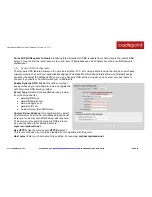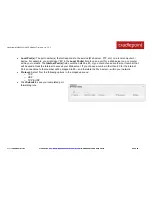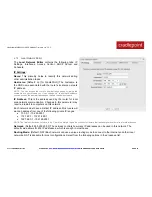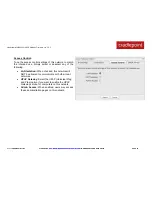
CRADLEPOINT
MBR1400| USER MANUAL Firmware ver. 3.5.0
© 2012
CRADLEPOINT, INC. PLEASE VISIT
HTTP://KNOWLEDGEBASE.CRADLEPOINT.COM/
FOR MORE HELP AND RESOURCES
PAGE 76
6.7.2
Local Network Editor
The
Local Network Editor
contains the following tabs: IP
Settings, Interfaces, Access Control, DHCP Server and
Schedule.
IP Settings:
Name:
This primarily helps to identify this network during
other administration tasks.
Hostname:
[Default: cp (for CradlePoint)] The hostname is
the DNS name associated with the router's local area network
IP address.
NOTE:
You can access the router‘s administration pages by typing the
hostname into your browser, so if you change ―cp‖ to another hostname,
you can access the administration pages through the new hostname.
IP Address:
This is the address used by the router for local
area network communication. Changes to this parameter may
require a restart to computers on this network.
Each network must have a distinct IP address. Most users will
want an address from one of the following private IP ranges:
10.0.0.1 - 10.255.255.1
172.16.0.1 - 172.31.255.1
192.168.0.1 - 192.168.255.1
NOTE: The final number does not have to be 1, but it is a simple, logical convention for routers that leaves higher numbers free for other devices.
Netmask:
(Default: 255.255.255.0) The netmask controls how many IP addresses can be used in this network. The
default value allows for 254 IP addresses, which is enough in most cases.
Routing Mode:
(Default: NAT) Each network can use a unique routing mode to connect to the Internet and other local
networks. NAT is desirable for most configurations. Select from the following options in the dropdown list:
Summary of Contents for MBR1400 Series
Page 1: ......
















































